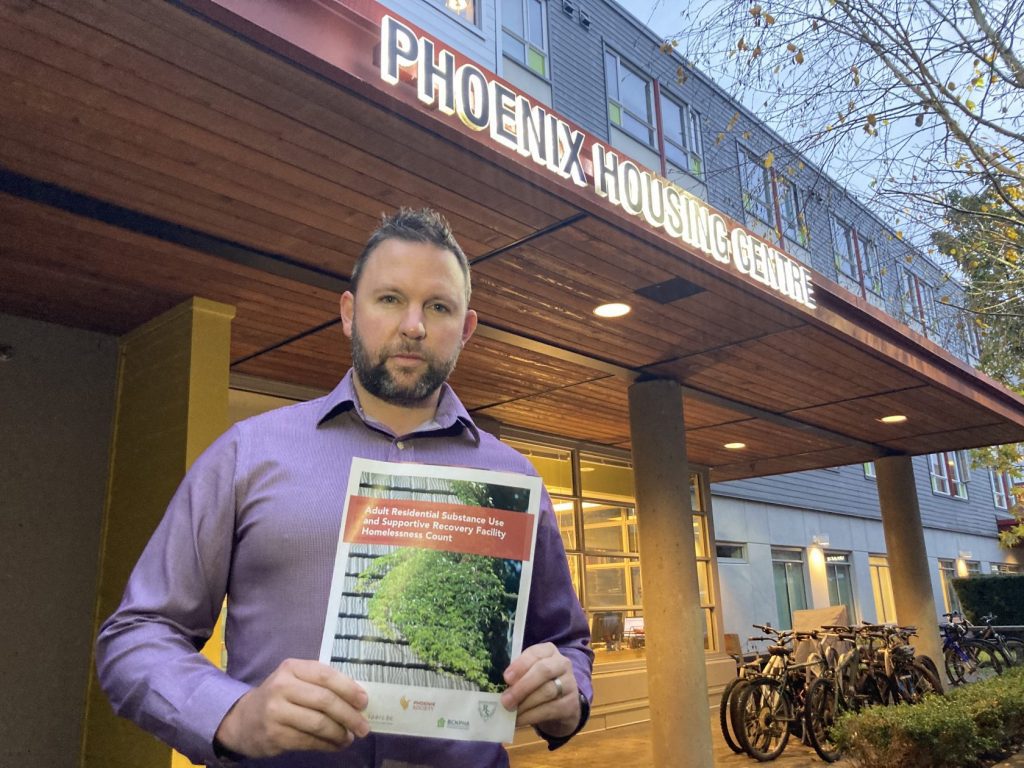The first-ever count of individuals living in recovery facilities in the Metro Vancouver region happened this year, and it happened in Surrey with support from the Phoenix Society.
“This is a first-of-its-kind study and has been several years in the making,” says Phoenix Society CEO Keir Macdonald. “We are thrilled and thankful the BC Non-Profit Housing Association decided to support us conducting this count. I approached BCNPHA with the idea of this Surrey-specific pilot project as I saw this as a major gap in the regional count.”
While the long-standing regional count captures those living in emergency shelters, women and children living in transition homes, those staying temporarily in hospitals or correctional facilities and of course street-entrenched individuals living outdoors who identify as being homeless, it has never included recovery facilities.
The Surrey Recovery Facilities Homeless Count was administered across 30 licensed residential substance use facilities and registered supportive recovery facilities in Surrey, representing a sample of 350 recovery spaces and generating a total of 192 responses.
Of those surveyed, 68 per cent facilities had been homeless before – 33 per cent in the last year alone.
“Without access to supportive recovery facilities, many individuals who rely on this support could end up living on the streets again,” says Macdonald. “Close to 40% said they didn’t know where they would live after leaving recovery and 78% of respondents reported that they did not pay any rent somewhere so potentially could face homelessness when they left their program.”
Click here to read the full report.
IN THE NEWS: Surrey homeless, recovery counts show need for long-term solution (Surrey Now-Leader, Nov. 28, 2020)
IN THE NEWS: Report shows people in Surrey recovery facilities experience homelessness (Vancouver Sun, Nov. 27, 2020)
This Surrey count was implemented in March 2020 at the same time as the broader regional homeless count, to help clarify our knowledge and understanding of homelessness within this segment of the population.
It provides better data to utilize in advocacy efforts but also highlights the precarious nature of the housing situation of those in recovery facilities, like Phoenix.
“We need data to advocate,” Macdonald adds. “This may not provide a complete snapshot, but it provides a better one. Housing is still so far behind the need, and not counting those individuals living in these facilities is a huge gap.”
“We hope that this count can be continued and expanded upon in future years not only here in Surrey, but for the whole region. Recovery operations, like Phoenix, need to be part of this snapshot to better demonstrate the need. Recovery services play such as important role in helping break the cycle of poverty, substance misuse and homelessness.”
In the 2020 Metro Vancouver Homeless Count numbers, released on Nov. 26, a total of 3,634 people were identified as experiencing homelessness across the region. The largest numbers of people experiencing homelessness were found in Vancouver (2,095), Surrey (644) and Langley (209).
“The recently released regional count showed 173 unsheltered persons in Surrey and we know this is an undercount,” says Macdonald. “A further 471 were stuck in the shelter system. Greater access to safe, affordable and appropriate housing is urgently needed.”
Thank you @laurenpcollins1 + @SurreyNowLeader for capturing the importance of this work.
When you combine the 2020 regional + recovery facility homeless counts “it gets to be a pretty scary number for Surrey. You start getting up around that 1,000 mark.” – @KeirMacdonald3 https://t.co/Gy13bhluXW
— Phoenix Society (@Phoenix_Society) November 28, 2020
The Surrey Recovery Facilities Homeless Count report provided key recommendations:
- That city staff and recovery facility operators work together to create a recovery continuum of care in a Made in Surrey response for people indicating that they are ready to enter treatment – ie: a variety of models of recovery are available to meet different needs of people seeking recovery
- That the City of Surrey staff work with BC Housing and the Surrey Road to Home Society which includes members of the Recovery Community to ensure that adequate housing is available for people who have completed their treatment and are moving onto the next stage of their life by advocating for funding to increase housing options in the city
- That all homeless counts conducted across the province include counts of people in licensed/regulated support recovery facilities
For media inquiries, please contact:
Amy Reid – [email protected]

